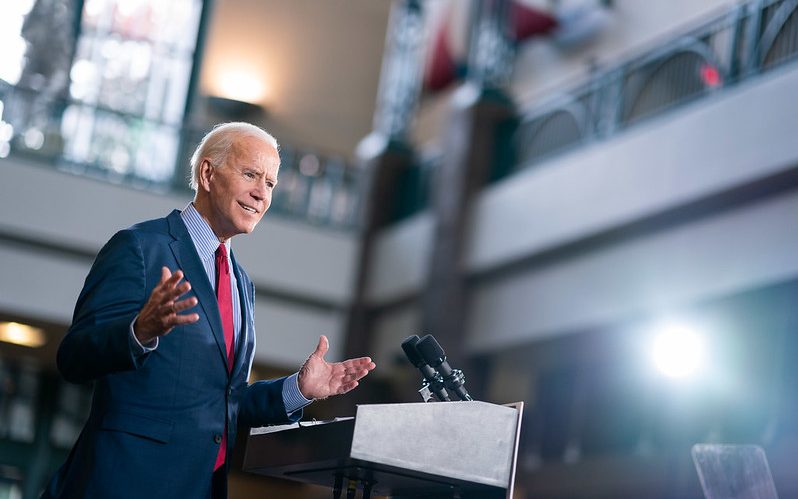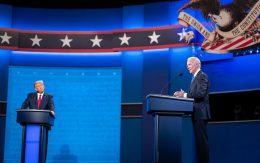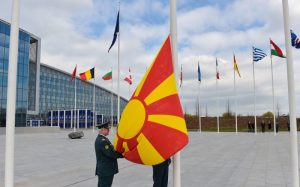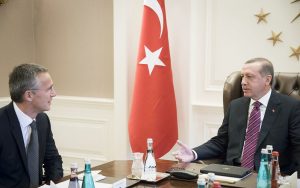Trump has done his best to isolate America from the international order. What are the prospects for a Biden administration to bring the U.S. back to a multilateral system?
President Donald Trump has long been a critic of America’s involvement in alliances, trade agreements, and security pacts – anything which involves the U.S. collaborating with other nations. In contrast, President-elect Joseph Biden has posited himself as an internationalist ready to bring the U.S. back to the multilateral world order. This article provides an overview of Trump’s international policies, their effect on America’s place within transnational power structures, and what Biden will likely do to move the U.S. back into the realm of international cooperation. The piece will conclude with some brief policy recommendations for the Biden administration to help create a climate of peace and cooperation among nations.
Trump’s International Policy
Paris Climate Accord
Donald Trump successfully withdrew the U.S. from the Paris Climate Accord, despite rising global temperatures and increasingly extreme natural disasters around the world.
NATO
While Trump did not pull the U.S. out of NATO, he was a frequent critic of the organization, and in 2019 even discussed withdrawing from the security pact. The President told his advisors that “he did not see the point of the military alliance” and “presented (it) as a drain on the United States”. This included discussing the amount other NATO allies pay for defence “We pay far too much and they pay far too little”. His advisors eventually convinced him that NATO was beneficial to U.S. strategic interests, and kept America as a member of the alliance.
Trans-Pacific Partnership
Consistent with the protectionist ideas he has championed, Trump pulled the U.S. out of the Trans-Pacific Partnership on his third day in office.
Iran Nuclear Deal
Trump pulled out of the Joint Comprehensive Plan of Action, otherwise known as the Iran Nuclear Deal, as a part of his isolationist policies, claiming it was a “horrible, one-sided deal”. This further strained relations between the U.S. and Iran, as well as with European allies who unsuccessfully lobbied the U.S. to reconsider the move.
World Health Organization
Trump moved to withdraw the U.S. out of the W.H.O. in 2020, despite being in the midst of the largest global pandemic for a century. Trump said that “China has total control over the World Health Organization”, a completely unsubstantiated claim.
United Nations
Trump’s speech at the U.N. exemplified his thoughts on the international order; “As President of the United States, I will always put America first”. Trump has dealt considerable blows to the integrity of the U.N., “given that the Trump administration has withdrawn from participation in the Human Rights Council, refused funding for Palestinian refugees, and is $3.6 billion behind on its financial contributions to the organization”.
Where Does This Leave an Incoming Biden Administration?
We have witnessed Trump’s record of isolationism, including burning bridges with allies and enemies alike. While we do not know exactly what a Biden foreign policy will look like, we can look at his record as a politician and the promises his campaign has made to have an idea of what we can expect from his administration.
Biden has already contrasted his future administration’s approach to international relations to that of the Trump administration. His campaign website writes “Arguing that our policies at home and abroad are deeply connected, Joe Biden announced that, as president, he will advance the security, prosperity, and values of the United States by taking immediate steps to renew our own democracy and alliances, protect our economic future, and once more place America at the head of the table, leading the world to address the most urgent global challenges.”
Paris Climate Accord
Biden claims that he will return to the Paris Climate Accord on the first day of his presidency, in addition to setting the goal of zero-emissions by 2050.
NATO
Biden’s campaign website discusses how he would recommit to multilateralism; “A Biden administration will do more than restore our historic partnerships; it will lead the effort to reimagine them for the future.” This includes “keeping NATO’s military capabilities sharp” and “calling on all NATO nations to recommit to their responsibilities as members of a democratic alliance”.
Iran Nuclear Deal
One of the Obama-Biden administration’s most important accomplishments, the Iran Nuclear Deal, was reversed by President Trump. Not only was Biden a part of the initial agreement as VP under Obama, but he has also made it clear that he is willing to rejoin the pact, under the condition that Iran meets certain conditions. “If Tehran returns to compliance with the deal, President Biden would re-enter the agreement, using hard-nosed diplomacy and support from our allies to strengthen and extend it, while more effectively pushing back against Iran’s other destabilizing activities.” Biden would have to work with hostile Republican members of Congress, and Iran will no doubt have strong stipulations to rejoining. However, the path for peace with Iran makes a compelling case for cooperation with the regime.
Trans-Pacific Partnership
While the TPP was originally enacted during Biden’s tenure as Vice President, it seems unlikely that the U.S. will return to this specific trade agreement. The Biden campaign website makes no mention of the TPP, but it is likely he will look to rebuild trade alliances once in office. His website puts out a vague call for “strengthening cooperation with democratic partners beyond North America and Europe by reaching out to our partners in Asia to fortify our collective capabilities and integrating our friends in Latin America and Africa”. However, this tells us little about specific trade policies that the incoming administration will propose. President-elect Biden will also have to deal with the gap left by America’s withdrawal from the TPP, as over a dozen Asian/Pacific countries have created a trade pact which excludes the U.S. – just another example of other countries building around the absence of American involvement in international affairs.
On November 15, 2020, China and 14 other countries signed the Regional Comprehensive Economic Partnership (RCEP). This free-trade agreement includes 2.2. Billion people, including a bigger population than any other free trade deal in human history. The TPP was originally meant to be an alternative to the RCEP, as it would have included the U.S. in the deal while excluding China. China moving to fill in the vacuum that the Trump administration created is exemplary of how American power has diminished, and how other nations have taken steps to compensate for the absence of U.S. involvement in the multilateral order.
World Health Organisation
Biden has said that he will immediately rejoin the W.H.O on his first day in office as President. However, like many other international structures, the U.S. will be reentering a vastly changed organization. America will be operating without the power and prestige it had before its withdrawal, as other countries have filled the space the U.S. left; “European nations in particular have been able to carve out valuable roles for themselves in the global health space”. Upon reentering the W.H.O., the U.S. will have to adjust to its lack of leadership status within the organization, and will have to act accordingly.
United Nations
Although Biden does not mention the U.N. on his campaign website, he has long been a strong supporter of the organization. As Vice President, Biden attended numerous meetings of the United Nations General Assembly with President Obama, including a 2014 summit on U.N. Peacekeeping operations. There is even a U.S. law strengthening the U.N. named after him – the so-called “Helms-Biden Law”, which required the U.S. to continue to pay its dues to support U.N. Peacekeeping operations. Based on President-elect Biden’s commitment to rejoining the international community, and his former actions supporting the institution, it is likely that his administration will be active in rebuilding the U.N.
Conclusion
The outgoing Trump administration and the incoming Biden administration have clear differences in how they approach international relations. Trump has acted in accordance with his “America First” isolationist policies, which has considerably diminished the influence of the United States and hindered American progress in international affairs. Biden has much work to do in order to rebuild America’s relationships with other nations and regain its place in the international order. It is a daunting task, but all signs indicate that this administration will work towards bringing the U.S. back to being a member of the community of nations.
Policy Recommendations
The Biden administration should make it clear from the offset that they are serious about returning America to the world community, not just by words, but by decisive action. Biden has spoken eloquently on the internationalist ideals he wishes to bring to foreign policy, that in and of itself a stark contrast to Trump’s jingoist rhetoric. The policies outlined above are an excellent start to America departing from the self-isolation of Trumpism. The Biden administration has further expanded upon foreign policy that reflects more humanitarian values, such as ending U.S. support for the genocidal war that Saudi Arabia has been waging against Yemen and stopping the practice of family separation at the U.S.-Mexico border. The incoming administration could go further in establishing America’s true commitment to human rights by abolishing Immigration and Customs Enforcement (I.C.E) and the Border Patrol, both responsible for inhumane treatment and the deaths of many migrants. In addition, President-elect Biden could show that the United States does not view itself as “above” the international order by ratifying the Rome Statute of the International Criminal Court. This would mean joining the ICC as a member state, and therefore allowing the possibility of prosecution of American citizens for war crimes. Many of those opposed to the U.S. joining claim that it would impede the sovereignty of the nation. However, the ICC only enforces international law in the case of truly heinous acts, as the only crimes that the ICC prosecutes are those involving genocide, crimes against humanity, war crimes, and the crime of aggression (Article 6-8, Rome Statute, ICC). Therefore, those concerned with matters of American sovereignty should only take issue with the adoption of this statute if they oppose the prosecution of those suspected of reprehensible transgressions which violate the basic dignity of human-kind.
President-elect Biden seems ready to move the U.S. back into successful international cooperation. It is likely that his administration will try to return America to the role it played in a multilateral world before Trump. However, a Biden Presidency should not only restore America’s place in world affairs, but reposition the U.S. as an equal partner in achieving political, economic, military and humanitarian goals within a multilateral framework. If the U.S. can successfully return to internationalism, it will not only benefit America, but move the world towards cooperation, peace, human rights, and mutual respect and understanding between all nations.
Sources
Biden-Harris Campaign Page: The Power of America’s Example: The Biden Plan for Leading the Democratic World to mee the Challenges of the 21st Century, https://joebiden.com/americanleadership/#, accessed 28.11.2020
Business Insider (2020): Here’s what’s in the 2015 nuclear deal with Iran that the country withdrew from amid heightened tensions with the US, https://www.businessinsider.com/iran-nuclear-deal-explained, accessed 28.11.2020
Foreign Policy (2020): What the U.N. Is Good For… or Could Be, https://foreignpolicy.com/2020/09/21/what-the-u-n-is-good-for-or-could-be/, accessed 28.11.2020
International Criminal Court: Rome Statute of the International Criminal Court, https://www.icc-cpi.int/resource-library/documents/rs-eng.pdf, accessed 28.11.2020
Politico (2019): Trump scuttles Trans-Pacific trade pact, Jan. 23, 2017, https://www.politico.com/story/2019/01/23/trans-pacific-trade-pact-2017-1116638, accessed 28.11.2020
Politico (2020): Trump announces U.S. withdrawal from the World Health Organization, https://www.politico.com/news/2020/05/29/us-withdrawing-from-who-289799, accessed 28.11.2020
Politico (2020): Biden faces new global health world order, https://www.politico.eu/article/biden-world-health-organization-reform-europe/, accessed 28.11.2020
The New York Times (2018): https://www.nytimes.com/2018/05/08/world/middleeast/trump-iran-nuclear-deal.html, accessed 28.11.2020
The New York Times (2019): Trump Discussed Pulling U.S. From NATO, Aides Say Amid New Concerns Over Russia, https://www.nytimes.com/2019/01/14/us/politics/nato-president-trump.html, accessed 28.11.2020
The New York Times (2020): U.S. Quits Paris Climate Agreement: Questions and Answers, https://www.nytimes.com/2020/11/04/climate/paris-climate-agreement-trump.html, accessed 28.11.2020
The New York Times (2020): https://www.nytimes.com/2020/11/17/world/middleeast/iran-biden-trump-nuclear-sanctions.html, accessed 28.11.2020
The New York Times (2020): China-Led Trade Pact Is Signed, in Challenge to U.S. https://www.nytimes.com/2020/11/15/business/china-trade-rcep.html, accessed 28.11.2020
The White House (2017): Remarks by President Trump to the 72nd Session of the United Nations General Assembly, https://www.whitehouse.gov/briefings-statements/remarks-president-trump-72nd-session-united-nations-general-assembly/, accessed 28.11.2020
The White House (2018): Remarks by President Trump on the Joint Comprehensive Plan of Action, https://www.whitehouse.gov/briefings-statements/remarks-president-trump-joint-comprehensive-plan-action/, accessed 28.11.2020
The White House (2020): Remarks by President Trump on Actions Against China, https://www.whitehouse.gov/briefings-statements/remarks-president-trump-actions-china/, accessed 28.11.2020
UN Dispatch (2020): Joe Biden and the United Nations, https://www.undispatch.com/joe-biden-and-the-united-nations/, accessed 28.11.2020








Be First to Comment